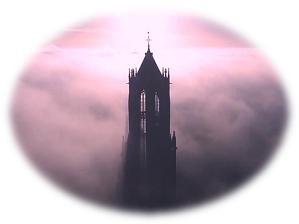The Paraclete – His Person and His Work
The Paraclete – His Person and His Work
The Person of the Paraclete⤒🔗
(The word “Paraclete” denotes the Holy Spirit as our advocate, our counselor)
The pronouncements that Jesus used to introduce the Paraclete teach us something about the person of the Holy Spirit. It is undoubtedly clear that Jesus presents the Holy Spirit as a person, and definitely not as a divine power or a sort of divine fluid that would flow from God into man. The fact that in his first expression Jesus calls the Holy Spirit the “other Comforter” (John 14:16) is decisive evidence. With this, Jesus witnesses that he himself is the first Paraclete. That is also how John identifies him in his first letter (1 John 2:1). There are commentators who deny the personal character of the Spirit as Paraclete in another way, namely, by identifying the Paraclete with the exalted Christ (Stevens, 1899:214-215; Scott, 1906:343). In their view the Paraclete is none other than the exalted, active Christ. This viewpoint needs to be rejected categorically. Although we can speak of an identity between Christ and the Spirit insofar as their function is concerned, John maintains a clear distinction between the persons. The Spirit is not Christ. He is the other Paraclete (cf. Ladd, 1974:294, 295). The Holy Spirit is a person with his own identity. It cannot be emphasized enough that the Holy Spirit displays personal characteristics in the Paraclete statements (Mühlen:98ff.). Jesus testifies of the Holy Spirit that he will teach and bring to remembrance (John 14:26), that he will bear witness (15:27), and that he will convict (16:8). He will guide into all truth and declare it to us (16:13–14). All these activities show irrefutably that the Holy Spirit is a person.
 There is yet more to Jesus’ pronouncements about the Paraclete; there is more to be said about the Holy Spirit. Not only is he a person; he is a divine person. The Paraclete pronouncements reveal to us the most harmonious cooperation of Father, Son, and Holy Spirit. In Jesus’ first pronouncement about the Paraclete, it is the Father who sends forth the Spirit as Paraclete in answer to the Son’s prayer (John 14:16). In the second Paraclete pronouncement the Father sends the Paraclete in the Son’s name (John 14:26). From John 16:7 we can read that the Son will send the Paraclete. In John 15:25 the two lines of the sending of the Spirit by the Father and the Son are coming together in trinitarian unity: the Spirit proceeds from the Father, Christ sends him, and he comes as Comforter. Christ is the one sent by the Father, and the Spirit in turn is the one sent from the Father and the Son. It is therefore the triune God who reveals himself in the activities of the Paraclete. We must always keep in mind this trinitarian aspect in the work of the Holy Spirit as Paraclete. In Jesus’ Paraclete pronouncements the secret of the trinity is not revealed as an abstraction, but it centres on the aspect of salvation through the trinity, for our aid (van ’t Spijker, 1984:274). As Paraclete the Spirit is He who is presented by the Father and the Son, to our benefit. He teaches us to know Christ, and he leads us to the Father.
There is yet more to Jesus’ pronouncements about the Paraclete; there is more to be said about the Holy Spirit. Not only is he a person; he is a divine person. The Paraclete pronouncements reveal to us the most harmonious cooperation of Father, Son, and Holy Spirit. In Jesus’ first pronouncement about the Paraclete, it is the Father who sends forth the Spirit as Paraclete in answer to the Son’s prayer (John 14:16). In the second Paraclete pronouncement the Father sends the Paraclete in the Son’s name (John 14:26). From John 16:7 we can read that the Son will send the Paraclete. In John 15:25 the two lines of the sending of the Spirit by the Father and the Son are coming together in trinitarian unity: the Spirit proceeds from the Father, Christ sends him, and he comes as Comforter. Christ is the one sent by the Father, and the Spirit in turn is the one sent from the Father and the Son. It is therefore the triune God who reveals himself in the activities of the Paraclete. We must always keep in mind this trinitarian aspect in the work of the Holy Spirit as Paraclete. In Jesus’ Paraclete pronouncements the secret of the trinity is not revealed as an abstraction, but it centres on the aspect of salvation through the trinity, for our aid (van ’t Spijker, 1984:274). As Paraclete the Spirit is He who is presented by the Father and the Son, to our benefit. He teaches us to know Christ, and he leads us to the Father.
The Work of the Paraclete in the Church←⤒🔗
When in the second place we now arrive at the work of the Paraclete, it must strike us that he has been assigned a great and comprehensive task. We can distinguish his work as an internal and an external work, a work aimed at the inside, that is, the church, and a work aimed at the outside, that is, the world. When we speak of the Paraclete’s work in regard to the church he is qualified as the “Spirit of truth,” but when it deals with his work in the world the Paraclete is called the Holy Spirit.
The words “Spirit of truth” typify concisely the kind of work the Holy Spirit does in regard to the church and the believers. R. Bultmann has drawn attention to the fact that in John’s writings the Holy Spirit is not as much associated with charismatic signs as he is in Paul’s writings, but that John places all emphasis on his teaching capacity (Bultmann, 1953:440ff.). We also need to keep in mind that in Jesus’ farewell speech, where he instructs us about the Paraclete, some very foundational functions of the Holy Spirit are not mentioned, such as regeneration and recreation, renewal and sanctification. The task of the Holy Spirit is here definitely another task than what Jesus ascribed to the Holy Spirit in his conversation with Nicodemus in John 3. The specific aspect of the task as Paraclete is that as the Spirit of truth he will be and remain with the disciples (John 14:16, 17). While he is with them, yes even in them, he acts as the great Instructor who will teach the believers all things (John 14:26). He will bring to remembrance what Jesus has said and taught, and will guide them into all the truth (John 14:13).
 As Paraclete the Spirit will fulfill his teaching office as the Spirit of truth. The expression “truth” in John’s Gospel must be understood against the background of the Old Testament. It indicates the faithfulness and veracity of God’s covenant. The word “truth” connotes God’s reliability in fulfilling his promises (Kotze, 1975:208). As the Spirit of truth he will provide witness of the loyalty and love of God as revealed in the life of Christ, for he will glorify Christ (John 16:14).
As Paraclete the Spirit will fulfill his teaching office as the Spirit of truth. The expression “truth” in John’s Gospel must be understood against the background of the Old Testament. It indicates the faithfulness and veracity of God’s covenant. The word “truth” connotes God’s reliability in fulfilling his promises (Kotze, 1975:208). As the Spirit of truth he will provide witness of the loyalty and love of God as revealed in the life of Christ, for he will glorify Christ (John 16:14).
In the work of the Paraclete as teacher of the disciples and as teacher of the church we can distinguish three things. In the first place he will reveal and point the way to the full truth (John 16:13). This is his signpost function. The disciples still had great difficulty understanding Jesus’ instruction (John 16:12). His suffering, the cross, their Master’s death–these were all matters they could not comprehend. But the Holy Spirit will guide them on the road to a full understanding. After the death and resurrection of Christ the Spirit of truth will make them understand the meaning of these events, these facts of salvation (Ladd, 1974:296). He will solve for them the riddle of Jesus’ death on the cross. It is the Holy Spirit who has made known to the disciples the saving power of Jesus’ death (cf. Floor, 1982:74). The Spirit of truth continues the instruction that Jesus gave on the evening of his resurrection day (Luke 24:27, 32).
A second very important task of the Paraclete is the direction that he offered in establishing the canon of Scripture (Grosheide, 1950:376). This guidance, which laid the foundation for the completion of the Bible, is continued whenever we use his Word. The Holy Scriptures as the book of the Spirit can only be understood with the aid of the Spirit (cf. Ridderbos, 1949:315).
In this teaching office of the Spirit as Paraclete we also discover a third aspect. In his continuous work of teaching, he leads us to Christ (John 16:13). The expression, “He will teach you” (John 14:26) could be described as: he will appropriate it to you, he will make you share what Christ has gained (van ’t Spijker, 1984:274). Just as the work of Christ can be summarized in the expression “procurement of salvation,” so we can call the work of the Holy Spirit the “appropriation of salvation.” This useful distinction between the work of Christ and the work of the Holy Spirit has then also been applied in the Reformed theology. The teaching office of the Spirit as Paraclete has in its ‘appropriation of salvation’ a clear Christological purpose. Everything is focused on Christ. Christ sends the Paraclete to his church to bring us to Christ and through him to bring us also to the Father. It is written in John 6:45: “Everyone who has heard and learned from the Father comes to me.” It is the Paraclete who takes care of this hearing and learning. Therefore, we can also say: whoever hears and learns it from the Spirit comes to Christ. It will be clear that this hearing and learning through the Spirit does not occur outside of the scope of the Word. For Jesus has said emphatically that the Spirit, in both teaching and bringing to remembrance, is bound to a distinct limitation or demarcation: “all that I have said to you” (John 14:26). The teaching office of the Spirit cannot be separated from Christ’s words. The Spirit will not speak on his own authority (John 16:13). All that he hears he will speak. The words of Christ are the manual of the Holy Spirit, and form the basis for all his teaching activity.
Of course, all of this has meaning also for the Christian experience. What is the experience of someone who is taught and led by the Paraclete? In his work the Paraclete is so fully focused on Christ – he is sent by Christ and he aims for nothing less than to glorify Christ – that also the experience that he works in us will be a Christ-experience. All spiritual experiences have their source in Christ. We need to keep in mind that Christ-experience constitutes faith-experience, experience as fruit of faith in Christ (van ’t Spijker, 1984:353). The Reformation has never denied the significance of the experience. In the Reformed confessions we see many expressions that have a bearing on the experience. True faith is always accompanied by experience, although we may never replace faith with experiences (Jonker, 1981:238). The difference between the church and the Anabaptist movement from the time of the Reformation, or from the Charismatic movement of the 20th century, should not centre around the question whether there should be room for religious experience or sensitivity. The difference becomes apparent when the question is whether experience is a fruit of faith in Christ, or whether the experience comes in the place of faith in Christ (Maris, 1979:27). In the Canons of Dort much attention is given to the experience. To illustrate this with some quotations:
- a childlike fear of God, a godly sorrow for their sins, and a hunger and thirst for righteousness (Ch. I, Art. 12)
- the awareness and assurance of this election (Ch. I, Art. 13)
- to know and experience that by this grace of God they believe with the heart and love their Saviour (Ch. III/IV, Art. 13)
- it is clearly a supernatural, most powerful, mysterious, and at the same time most delightful, marvelous, mysterious, and inexpressible work [in us] (Ch. III/IV, Art. 12)
All these experiences are not outside of Christ. This shows in the expression that the believers fervently love their Saviour (I.13). This love is not separated from faith, but precisely a fruit of faith. Their believing with the heart and their loving of the Saviour are inextricably connected to each other (cf. III/IV.13). Also in the Reformed confession the experience is not separated from faith. The experience centres on Christ and is fruit of faith in him.
The Work of the Paraclete in the World←⤒🔗
The function of the Paraclete in the church differs from his task in the world. For the believers the Paraclete is truly the Comforter, the Guide, but in the world he will act as the great Accuser, the Prosecutor. “And when he comes, he will convict the world concerning sin and righteousness and judgment” (John 16:8).
 The Holy Spirit as the finger of God (Luke 11:20) is God’s accusation to the world. It is commonly accepted that at the time John wrote his Gospel, the word “paraclete” was in use by the Jews, specifically in a legal sense. This judicial colour of the word “paraclete” is also present in the Gospel according to John (Versteeg, n.d.: 40). John 16:8-11 represents a trial. God has a lawsuit with the world, where “world” indicates the world in enmity with God. In John’s time this is the Jews who oppose the gospel. It will be the task of the Holy Spirit as Paraclete, as Prosecutor – so reveals Christ – that in Jesus’ judgment over the Jews, he had right on his side, and that the Jews were wrong in their evaluation of Christ. The judgment of the Jews in regard to Christ will be dismissed summarily by the Paraclete, as being entirely unjust.
The Holy Spirit as the finger of God (Luke 11:20) is God’s accusation to the world. It is commonly accepted that at the time John wrote his Gospel, the word “paraclete” was in use by the Jews, specifically in a legal sense. This judicial colour of the word “paraclete” is also present in the Gospel according to John (Versteeg, n.d.: 40). John 16:8-11 represents a trial. God has a lawsuit with the world, where “world” indicates the world in enmity with God. In John’s time this is the Jews who oppose the gospel. It will be the task of the Holy Spirit as Paraclete, as Prosecutor – so reveals Christ – that in Jesus’ judgment over the Jews, he had right on his side, and that the Jews were wrong in their evaluation of Christ. The judgment of the Jews in regard to Christ will be dismissed summarily by the Paraclete, as being entirely unjust.
It also becomes clear in John 14 and 16 that God will execute his lawsuit with the world in a special way, that is, through the missionary proclamation of the disciples. Mission work is placed in the framework of God’s lawsuit against the world (Versteeg, n.d.: 41). God aims to accomplish his justice through the missionary activity of the church, supported by the Holy Spirit, and to realize his triumph in Jesus Christ.
This article was translated by Wim Kanis.

Add new comment